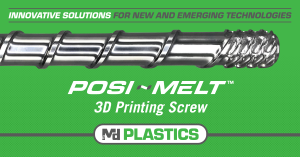The polymer processing industry continues to evolve with increasing demands for precision, speed, energy efficiency, and superior product quality. At the heart of this evolution lies one of the most critical components of any extrusion or injection molding machine: the Plasticating screw. Its geometry, metallurgy, and function significantly impact melt quality, throughput, and overall process stability.
Customizing plasticating screws to fit specific materials, processes, and product goals isn’t just a best practice—it’s a competitive necessity.
The Role of the Plasticating Screw in Polymer Processing
A plasticating screw is more than a simple rotating shaft. It’s the core mechanism responsible for conveying, melting, mixing, and pumping polymer materials through a barrel. The screw’s efficiency directly impacts product consistency, cycle times, and energy consumption. As resin properties and customer expectations grow more demanding, conventional, general purpose screws often fall short.
The screw operates across three main functional zones:
- Feed Zone – The zone responsible for Solids Conveying of solid plastic pellets.
- Compression (Transition) Zone – The zone responsible for Melting
- Metering Zone – The zone responsible for homogenizing and pumping of the polymer to the die or mold.
Each of these zones must be carefully calibrated for the polymer in use, the desired throughput, and the process’s specific thermal/mechanical characteristics.
Why Customization Matters
Material-Specific Optimization
Every polymer has unique thermal and rheological behaviors. High-performance polymers such as PEEK, PPS, LCP, and engineered nylons require precise control over temperature and shear to avoid degradation or incomplete melting. A custom-designed plasticating screw ensures that the melt is homogeneous, minimizing the risk of defects or processing inefficiencies.
For example:
- Amorphous polymers (e.g., ABS, PC) benefit from shear-heating and gentle compression.
- Semi-crystalline materials (e.g., PP, PE, Nylon) require well-defined melting zones and more aggressive transition designs.
- Filled compounds (e.g., glass- or carbon-filled resins) demand abrasion-resistant metallurgy and mixing sections that disperse fillers without excessive shear.
Process-Specific Requirements
Whether you’re processing for extrusion blow molding, film extrusion, or high-precision injection molding, each application benefits from tailored screw features such as:
- Varying length-to-diameter ratios (L/D) for residence time control.
- Specialized mixing sections to enhance melt uniformity.
- Barrier flights or double-flight designs to manage shear and reduce melt temperature spikes.
Key Considerations in Extrusion Screw Design
Designing a high-performance extrusion screw requires a holistic understanding of not only the material but also the machine, end-use product, and processing parameters. Below are some of the most influential design factors:
- Screw Geometry
This includes feed depth for solids conveying, compression ratio, feed, transition and metering lengths, flight radii, surface finish, and use of barrier and mixing sections for superior performance. Adjusting these can significantly influence shear rate, pressure pumping ability, and temperature distribution. - Compression Ratio
The ratio of feed depth to metering depth impacts how much the polymer is compressed. Too high, and materials may degrade. Too low and melting becomes incomplete. Engineers at Md Plastics carefully analyze melt flow indexes and thermal profiles to determine the ideal ratio. - Mixing Sections
There are a few Golden Rules for designing mixing sections, such as:- The mixing section should have minimum pressure drop, preferably by having a forward pumping capability.
- There should be no material hang-up or dead spots in the mixing section.
- The mixing device should completely wipe the barrel surface each revolution.
- The mixing device should be easy to clean, preferably by using normal purging techniques.
- The device should be reasonably priced.
All Polymer processing including Shear-sensitive polymers, products requiring pigment dispersion, and or filled materials benefit from specialized mixers. Options over the years include:
- Maddock mixers
- Saxton mixers
- Helical or blister ring mixers
- And our own Posi-MeltTM “XLA” dispersive/distributive mixer
- Wear and Corrosion Resistance
A custom screw should also be built to last. For abrasive or corrosive materials (like PVC, flame-retardant compounds, or glass-filled resins), Md Plastics recommends advanced metallurgy and surface treatments such as:- Nitrided steels
- Colmonoy 56 or 83 hardfacing
- D2, CPM 9V, or Hastelloy for chemical resistance
- HVOF Xc1000Ni Coatings
Benefits of a Custom Extrusion Screw
The advantages of a properly engineered screw extend across several critical dimensions:
Improved Melt Quality
Tailored screws minimize melt temperature variations and unmelted particles, ensuring consistent product properties.
Higher Throughput
Optimized geometry and compression lead to faster cycle times and better productivity without increasing energy input.
Energy Efficiency
Custom screws can reduce specific energy consumption by improving melting efficiency and minimizing pressure loss.
Longer Equipment Life
With proper materials and coatings, customized screws resist wear better than standard components—reducing maintenance costs and downtime.
Reduced Scrap Rates
Better mixing and temperature control reduce defects and improve first-pass yield.
Innovations from Md Plastics: Advancing Screw Technology
Since 1999, Md Plastics has been a leader in providing innovative plasticating solutions that drive profitability and efficiency for injection molders and extrusion processors alike. The company’s core philosophy is simple: better components lead to better parts and more consistent operations.
Md Plastics’ approach combines decades of experience with cutting-edge design tools and materials knowledge. Here’s how we do it:
- Proprietary Design Software
We calculate heat transfer, shear rates, and pressure profiles to match every screw to the exact resin and process. This predictive capability ensures fewer iterations, faster commissioning, and consistent performance. - Innovative Componentry
Our solutions extend beyond just screws—we engineer and or supply:- High-performance barrels
- Non-Return Screw tips/Check valves that exhibit the most consistent shot-to-shot part weights in the industry
- Patented Mini-ShutTM Automatic shutoff Nozzle Tip that eliminates string, drooling and stabilizes the melt pool
- Entire melt delivery systems (e.g., our Inject-EX TM system)
- Downsizing / Upsizing of Injection Units
- Vented Barrel Conversions
- LSR Conversions
- Focus on Process Control
We develop components and systems that enable tighter process control, such as our Melt-Profiler TM and Melt-IQTM product lines that reduces variability and ensuring repeatable results. This is critical when running medical-grade polymers, food-contact products, or precision parts with tight tolerances. - Application Engineering Support
Our team doesn’t just manufacture parts—we partner with clients to assess material behavior, troubleshoot process inefficiencies, and redesign systems to improve performance. Whether you need a quick upgrade or a ground-up solution, our engineers are ready to help.
Case in Point: Boosting Output in a Nylon-Glass Molding Operation
A recent client—a Tier 1 automotive supplier—was struggling with premature screw wear and inconsistent part quality while running 30% glass-filled nylon. Md Plastics evaluated their process and supplied a customized extrusion screw with:
- Hardened flights for wear resistance
- A Posi-Melt “XLA” distributive mixer to improve melt quality and control fiber breakage
The result: A 23% increase in throughput, 15% scrap reduction, and a 3x improvement in screw life.
When Off-the-Shelf Just Won’t Cut It
In today’s competitive manufacturing landscape, “good enough” is no longer acceptable. As polymers become more advanced and applications more demanding, standard screws simply can’t keep up. A customized extrusion screw from Md Plastics ensures you’re getting the most out of your equipment and material investment.
Don’t let outdated or generic screw designs limit your profitability. Whether you’re facing quality issues, throughput bottlenecks, or excessive maintenance, there’s a high-performance solution waiting for you.
Partner with Md Plastics
Since 1999, Md Plastics has been dedicated to helping processors like you achieve more with less—less downtime, less waste, less cost, and less complexity. Our extrusion screw designs are based on science, precision, and a deep understanding of polymer behavior.
If you’re ready to:
- Improve melt quality and viscosity variation
- Increase productivity
- Extend equipment life
- Reduce scrap and downtime
Then it’s time to contact Md Plastics. Let us engineer the ideal extrusion screw for your specific application and take your operation to the next level.
Call us directly to speak with one of our technical experts. The right screw design is the first step toward a better process.




